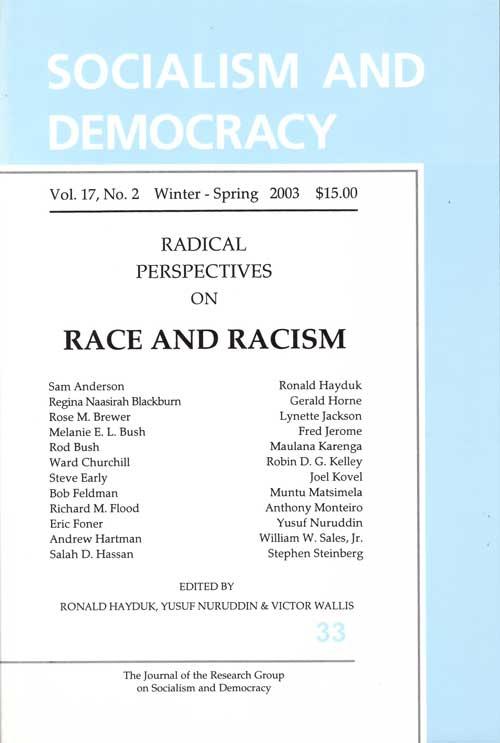The Truman Nelson Reader. Edited by William J. Schafer. (Amherst, Mass.: The University of Massachusetts Press, 1989).
While recently reading an anthology of W.E.B. Du Bois's newspaper columns (from radical left publications of the 1950s and early '60s like the National Guardian), I came across Du Bois's rave review of Truman Nelson's historical novel, The Surveyor, about John Brown's anti-slavery activism in Kansas.* I tried unsuccessfully to find a copy of the book in my local public library. What I did locate was the anthology under review, which appeared two years after Nelson's death.
Describing Nelson as "a committed Marxist radical," Professor Schafer asserts in his introduction that Nelson's three major historical novels "are the most intelligent, meticulous and profoundly dramatic historical fiction by an American in this century." Yet according to Schafer, "Nelson's achievement . has gone almost unacknowledged by critics and literary observers, probably because the historical novel is in bad repute with modern literary theorists and fiction writers."
In a 1973 essay that appears in this anthology, entitled "On Creating Revolutionary Art and Going Out of Print," Nelson provides a more specifically political interpretation for his becoming marginalized in the U.S. academic and literary world:
The Surveyor went forever out of print.What had happened was that the political-revolutionary historical novel was phased out of the American literary scene. The historical novel is a prime form of people's art. It can be very, very revolutionary and uncontrolled by the consciousness-controllers now deprinciple-izing and derevolutionizing students in the academic process-teaching counter-revolution. It seems clear that these same people now control the publishing, the publicizing and the criticizing process with the same iron hand with which they control their students. It is no longer possible to circumvent them by writing revolutionary history in the form of a novel nor is it possible to attain the distribution or viability of revolutionary essays or tracts until they appear somewhere on a "reading list." The only sensible suggestion on this matter comes from Lenin: "The first thing to do is deprive capital of the possibility of hiring writers, buying up publishers and buying newspapers, and to do this the capitalists and exploiters have to be overthrown and their resistance suppressed."
I went to a meeting where F.O. Matthiessen, author of The American Renaissance, spoke. He said that the man who meets the ultimate challenge of life is the one who can be with the oppressed against the oppressor. I decided to write to Matthiessen, who was then at Harvard. I was very class-conscious and introduced myself to him as a factory worker and told him that I would pay him to work with him at Harvard.Matthiessen agreed to meet with me and discuss my work. I began to write my first book, called The Sin of the Prophet. I could only meet with him on Sundays.I got a $2,500 advance from Little, Brown which enabled me to finish the book. Matty liked it and said that he would review it in the New York Times. Shortly afterward he was dead after jumping out of a window. He had been called to testify before a McCarthy committee and could not handle the situation. So I was left without Matthiessen. And a hostile critic, Perry Miller of Harvard, a bitter personal enemy of Matthiessen, reviewed the book in the Times and blasted the shit out of me.
I am now 65 and applying for social security. My monthly stipend will be $140. This could be devastating to think that my ultimate income is so little. My only recourse outside of my writing is welfare, which would bring it up to $200 a month. But I feel honored by this. I am proud of the fact that I have contributed eight revolutionary books without feeding any profit back into the system.
This was the sin of the prophet: that the men of learning and sensibility are capable of understanding the physical and political facts of their own existence, yet cannot commit the irrevocable acts needed to transform them. They proclaim what is wrong, but they hesitate to move against the wrong, and really don't want anybody else to.
His arraignment took place in February, 1951, his trial in November. So the lynch mob ran at him for six months, screaming at the top of its lungs that he was an agent of Russia.He was retired on a small pension and had very little money. He had to raise cash for his own defense in an agonizing series of talks and pleas to groups all over the country.His defense cost him $35,150, and it was all for nothing; the case was dismissed after some days of trial, without even going to the jury. The government had no case, said the judge.
Also included in the essay section are an excerpt from The Torture of Mothers and a chapter from The Right of Revolution that contains reflections about the political meaning of the 1967 African-American rebellion in Newark. (James Baldwin, incidentally, reviewing The Torture of Mothers in The Nation, described it as "an extraordinary moral achievement, in the great American tradition of Tom Paine and Frederick Douglass.")
Professor Schafer has done a great service by putting together The Truman Nelson Reader, and his introduction and comments throughout the book reflect a good appreciation of Nelson's significance in U.S. literary history. Since, as Nelson noted in his 1976 interview, "I consider myself to be a Marxist, guided by the concept of historical materialism," Marxist intellectuals who teach at U.S. universities might find it interesting to include this book on their course reading lists in the 21st century.
Reviewed by Bob Feldman

